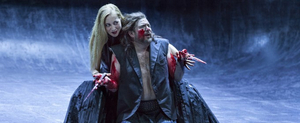Review: MACBETH at Grand Théâtre

One of the greatest stories ever written, adapted to one of the best operas ever created. If Shakespeare's Macbeth has always had the capacity to leave audiences speechless, Verdi's adaptation of this timeless narrative is by no means less impressive. This Friday, the Grand Théâtre of Luxembourg opened its doors to Michael Thalheimer's version of this famous opera, the first of three nights filled with all the musical strength and philosophic darkness that only Macbeth can provide. The award-winning director put together once again an impressive international cast, that performed flawlessly to the sound of our very own Luxembourgish Philharmonic Orchestra. Musical direction fell to conductor Gustavo Gimeno.
It is no surprise that most of those who work with the Scottish Play establish a somewhat tenebrous atmosphere, worthy of the dark moral choices taken by the protagonists. It can, therefore, get hard to create a show very different from those that have already been put together over the decades. But Thalheimer was here to live up to the challenge. The main concern of this production was not absolute historical realist, as it is for many directors who insist on elaborate settings and props. Nor was it to make a statement about what Macbeth should be - a classic and rigid operatic performance, or an innovative and trendy show with fresh elements forced on the audience. Multiple modern directors fall on this trap, but Thalheimer seemed to want to stay faithful to what Macbeth is all about - the feeling. The strength of the performances, the power of the voices and the flawless work of the orchestra, allied with perhaps the best lighting work we have seen since Broadway started covering Luxembourg, perfectly displayed the different shades of pain and ambition present in every character. The flashes of the initial thunderstorm, for instance, were nothing short of amazing, greatly adding to an already fabulous scene with countless deranged witches swaying to the sound of evil and prophecies.
Craig Colclough (Macbeth) was the most solid and consistent performer of the night. He presented a very clear - and perhaps even relatable - progression of Macbeth's moral values and perfectly displayed his downfall, both through physical presence and the intense emotion carried in every note he sang. Katia Pellegrino (Lady Macbeth) stood out as the most impressive singer, mesmerizing the audience with her vocal strength and passion. Her acting style was far more operatic than Colclough's. It took everyone's breath away in most scenes, especially in iconic moments, such as Duncan's assassination and the sleepwalking rant of insanity. We are however, left to wonder if such contrasting styles between the two main characters fully paid off from a visual point of view, since Macbeth's more sober and contained mannerisms could, in direct comparison (and only in direct comparison), make his wife's body language look to some as a tad over the top.
We cannot dwell too much in individual analysis, but a quick reference to Tareq Nazmi (Banquo). Nazmi stood out not only as a remarkable singer, but also as an actor in the heart-breaking of Banquo's assassination and during every moment he was present on stage as a ghost.
As much a we liked the performance of the main cast, however, the highlights of this show seemed to be the group numbers. The horde of witches was both fantastic and terrifying, and the almost constant presence of one bloody yellow head in the dark corner of the stage greatly contributed to the symbolism of the play. But nothing was as extraordinary as the song Patria Oppressa, where the company and the orchestra excelled at transmitting a feeling of despair and growing rage. It was a nation-focused and operatic At the End of Day and every direction choice worked wonderfully.
Our most sincere congratulations to the ensemble and everyone responsible for the show. There will be one last performance this Tuesday at our esteemed Grand Théâtre, so be sure to get a ticket while you still can!
Image credit: Annemie Augustijns
Reader Reviews



